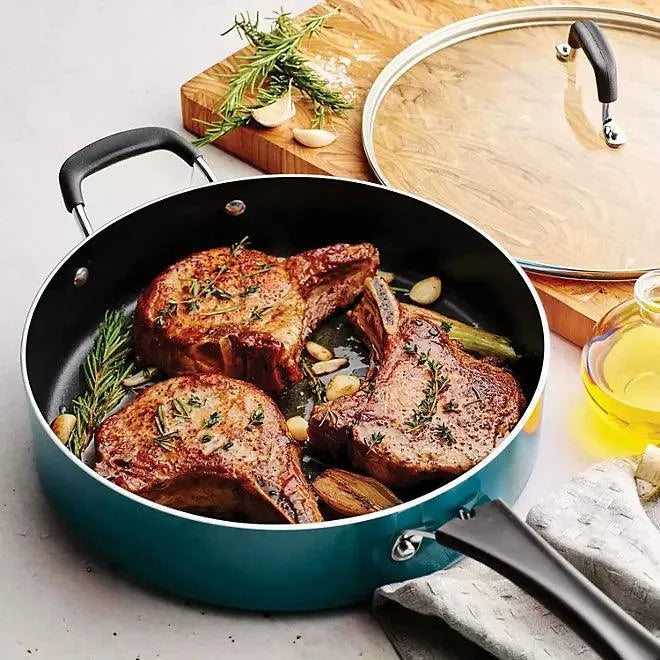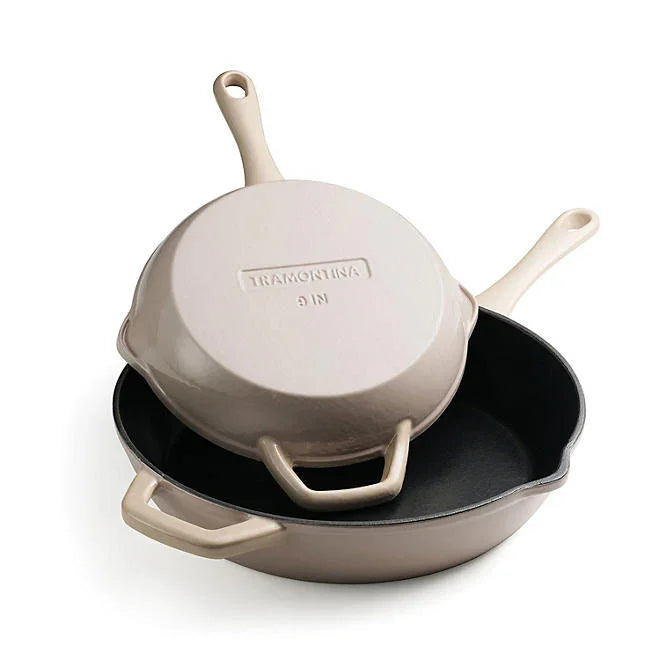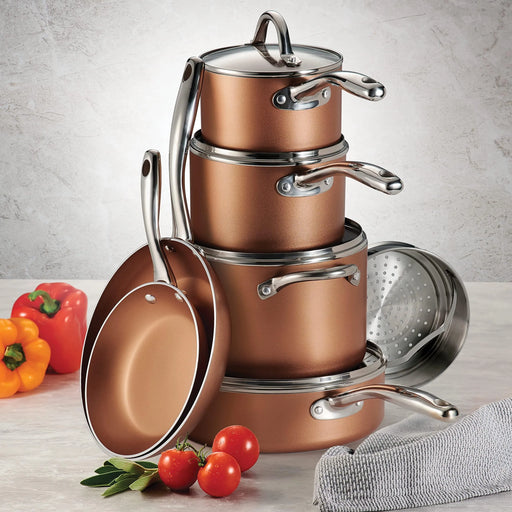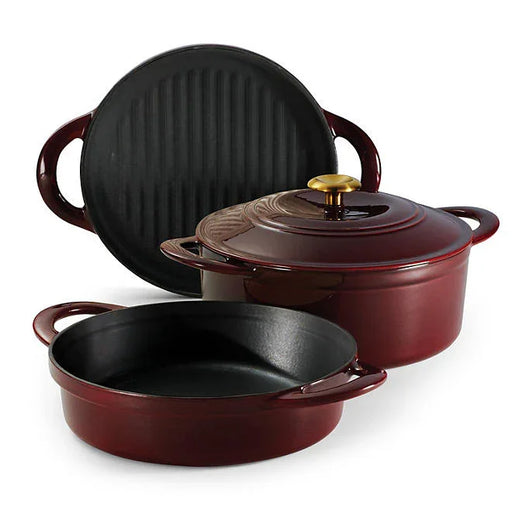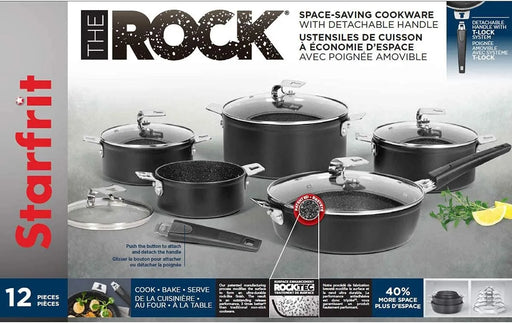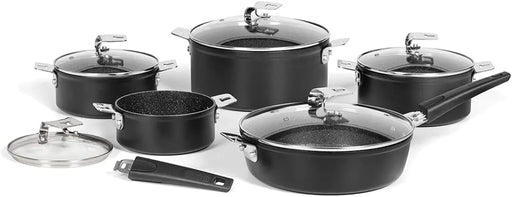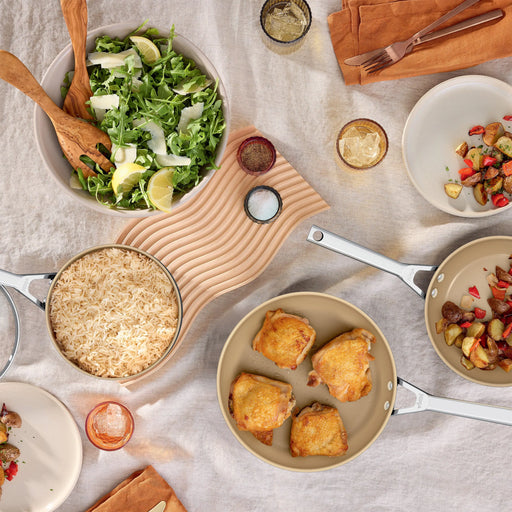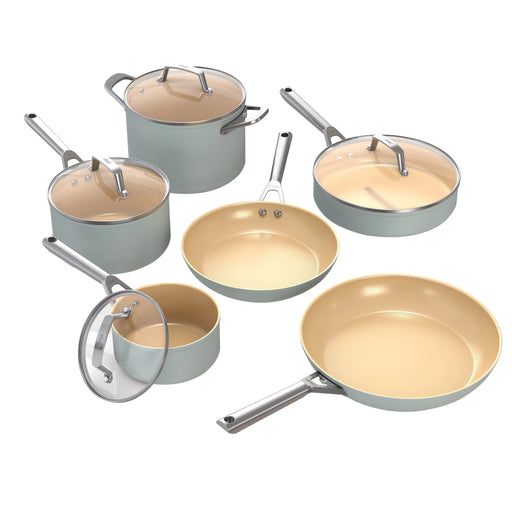When it comes to cooking, the right cookware can make all the difference.
For Kenyan households, where meals are often prepared with love and care, choosing between ceramic cookware and cast iron cookware can be a tough decision.
Both options have their unique benefits and drawbacks, and understanding these can help you make an informed choice that suits your cooking style, budget, and health needs.
We’ll dive deep into the pros and cons of ceramic and cast iron cookware, helping you decide which is best for your kitchen.
Ceramic Cookware: The Modern Choice
Ceramic cookware has gained popularity in recent years, especially among health-conscious Kenyans.
It’s known for its non-stick properties, vibrant colors, and lightweight design. But is it the right choice for your kitchen?
Pros of Ceramic Cookware
-
Non-Toxic and Health-Friendly
Ceramic cookware is free from harmful chemicals like PFOA and PTFE, which are often found in traditional non-stick pans.
This makes it a safer option for preparing meals, especially if you’re cooking for children or health-conscious family members.
-
Easy to Clean
Thanks to its non-stick surface, ceramic cookware is a breeze to clean. A simple wipe with a soft sponge is often enough to remove food residues, making it ideal for busy Kenyan households.
-
Lightweight and Easy to Handle
Unlike cast iron, ceramic cookware is lightweight, making it easier to handle, especially when cooking large meals or flipping pancakes.
-
Aesthetic Appeal
Ceramic cookware comes in a variety of colors and designs, adding a touch of elegance to your kitchen. It’s perfect for those who want their cookware to double as décor.
-
Even Heat Distribution
High-quality ceramic cookware distributes heat evenly, reducing the risk of hot spots that can burn your food.
Cons of Ceramic Cookware
-
Durability Concerns
Ceramic cookware is prone to chipping and cracking, especially if not handled carefully. It may not withstand the rough handling often seen in busy Kenyan kitchens.
-
Limited High-Heat Cooking
Ceramic cookware is not ideal for high-heat cooking methods like searing or frying. Excessive heat can damage the coating and reduce its lifespan.
-
Shorter Lifespan
Compared to cast iron, ceramic cookware has a shorter lifespan, especially if used frequently. The non-stick coating may wear off over time, requiring replacement.
Cast Iron Cookware: The Traditional Powerhouse
Cast iron cookware has been a staple in kitchens worldwide for centuries, and for good reason.
It’s durable, versatile, and perfect for slow-cooking traditional Kenyan dishes like githeri, mukimo, or stews.
Pros of Cast Iron Cookware
-
Exceptional Durability
Cast iron cookware is virtually indestructible. With proper care, it can last for generations, making it a cost-effective investment for Kenyan families.
-
Perfect for High-Heat Cooking
Cast iron can withstand extremely high temperatures, making it ideal for frying, searing, and baking. It’s perfect for preparing crispy mandazis or perfectly seared nyama choma.
-
Natural Non-Stick Properties
When properly seasoned, cast iron develops a natural non-stick surface that improves with use. This eliminates the need for chemical coatings.
-
Adds Iron to Your Diet
Cooking with cast iron can increase the iron content of your food, which is beneficial for individuals with iron deficiency—a common issue in Kenya.
-
Versatility
Cast iron cookware can be used on the stovetop, in the oven, or even over an open flame. This makes it ideal for both modern kitchens and rural setups where traditional cooking methods are still in use.
Cons of Cast Iron Cookware
-
Heavy and Bulky
Cast iron cookware is significantly heavier than ceramic, which can make it difficult to handle, especially for elderly family members or those with joint issues.
-
Requires Regular Maintenance
Cast iron needs to be seasoned regularly to maintain its non-stick properties and prevent rust. This can be time-consuming for busy households.
-
Slow Heat-Up Time
Cast iron takes longer to heat up compared to ceramic or other materials. However, it retains heat exceptionally well once it’s hot.
-
Reactive to Acidic Foods
Cooking highly acidic foods like tomatoes or citrus-based dishes can strip the seasoning and affect the flavor of your food.
Ceramic vs. Cast Iron: Which is Best for Kenyan Kitchens?
The choice between ceramic and cast iron cookware ultimately depends on your cooking habits, budget, and lifestyle. Here’s a quick comparison to help you decide:
| Feature |
Ceramic Cookware |
Cast Iron Cookware |
| Durability |
Prone to chipping/cracking |
Extremely durable |
| Weight |
Lightweight |
Heavy |
| Heat Retention |
Good |
Excellent |
| Maintenance |
Easy to clean |
Requires seasoning |
| Cost |
Affordable |
Higher initial cost |
| Best For |
Everyday cooking |
High-heat cooking, longevity |
Why Cast Iron?
Before diving into the top products, let's explore why cast iron cookware is worth the investment:
-
Unmatched Heat Retention: Cast iron heats evenly and holds heat longer than other materials, making it perfect for frying, baking, and roasting.
-
Durability: When properly cared for, cast iron can last generations.
-
Versatility: Works on gas, electric, and induction stovetops, and can go from stovetop to oven seamlessly.
-
Health Benefits: Cooking in cast iron can naturally increase your iron intake.
Best Cast Iron Cookware Available at ShopUSA
If you're looking for a premium Dutch oven, the Martha Stewart 6-quart enameled cast iron Dutch oven is a must-have. Designed for slow-cooking, roasting, and baking, this piece is both functional and stylish.
Features:
✔️ Elegant Design: A sleek enamel coating gives it a modern, high-end look.
✔️ Large Capacity: Perfect for making family meals, from stews to roasts.
✔️ Oven-Safe: Withstands high temperatures, making it ideal for baking bread.
✔️ Easy to Clean: The enamel surface prevents sticking and doesn't require seasoning.
💰 Price: KSh 16,995.00 (Discounted from KSh 22,500.00)
For those who love frying, searing, and baking, the Member’s Mark 2-Piece Enameled Cast Iron Skillet Set is a fantastic choice.
Features:
✔️ Two Sizes: Includes a 10-inch and 12-inch skillet for various cooking needs.
✔️ Pre-Seasoned & Enameled: Provides a non-stick surface with no need for seasoning.
✔️ Heavy-Duty Construction: Ensures even cooking and prevents hot spots.
💰 Price: KSh 9,995.00 (Originally KSh 12,995.00)
The Tramontina 7-Quart Dutch Oven is perfect for preparing large meals. Whether you're making a slow-cooked stew or roasting meat, this Dutch oven delivers excellent results.
Features:
✔️ Premium Enamel Coating: Reduces sticking and makes cleaning easy.
✔️ Superior Heat Distribution: Ideal for slow cooking and baking.
✔️ Durable Construction: Built to last for years.
💰 Price: KSh 14,995.00 (Discounted from KSh 23,428.76)
Choosing the Right Cast Iron Cookware
When shopping for cast iron cookware in Kenya, consider the following:
✔️ Enamel vs. Traditional: Enameled cast iron is easier to clean and doesn't require seasoning, while traditional cast iron can develop a natural non-stick surface over time.
✔️ Weight & Size: Cast iron is heavier than other cookware, so choose sizes that suit your cooking habits.
✔️ Maintenance: If you opt for traditional cast iron, seasoning and proper storage are essential to prevent rust.
Where to Buy Cast Iron Cookware in Kenya
For authentic Martha Stewart, Member’s Mark, and Tramontina cast iron cookware, ShopUSA Kenya is your go-to store. With fast delivery, competitive prices, and premium quality, ShopUSA makes it easy to buy authentic USA cast iron cookware in Kenya.
Final Thoughts
For Kenyan households, both ceramic and cast iron cookware have their place in the kitchen.
If you’re looking for a lightweight, easy-to-clean option for everyday cooking, ceramic cookware is a great choice.
However, if you value durability, versatility, and the ability to cook over high heat, cast iron is the way to go.
Consider investing in a mix of both to enjoy the benefits of each. For example, use ceramic pans for quick meals and cast iron pots for slow-cooked dishes. Whichever you choose, proper care and maintenance will ensure your cookware lasts for years to come.
